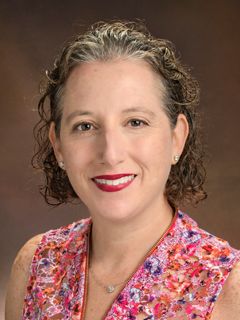HOW CAN WE HELP YOU? Call 1-800-TRY-CHOP
In This Section
Dr. Susan Furth, Clinical Vector Core, Mito Model, Immunotherapy

From the National Institutes of Health to the newspapers at your corner store, CHOP researchers made headlines in and around the community, with our scientists and the spaces they work in receiving accolades. Learn more about Chief Scientific Officer Dr. Susan Furth's recognition as a Healthcare Power Player, read a success story written about our Clinical Vector Core, and discover new insights into treatment approaches for pediatric brain tumors and mitochondrial disorders.

Susan Furth, MD, PhD
Dr. Susan Furth Named Metro Philadelphia Healthcare Power Player
Metro Philadelphia recognized Chief Scientific Officer and Executive Vice President of the Research Institute, Susan Furth, MD, PhD, as a Healthcare Power Player. The title honors the trailblazing nurses, physicians, executive leaders, and other healthcare professionals "who are developing innovative solutions and conducting research to improve patient care and advance our healthcare systems," according to the news outlet.
Besides leading the Research Institute, one of the largest pediatric biomedical research programs, Dr. Furth is also a distinguished scientist and globally recognized expert in pediatric kidney disease. Her work has helped to define the natural history and clinical co-morbidities in children with kidney disease, broken down barriers to creating clinical trials of novel therapies, and engaged the next generation of scientists through a long-standing passion for mentoring.
Alongside Dr. Furth, other Healthcare Power Players named included CHOP's Tami Benton, MD, Psychiatrist-in-Chief and Executive Director and Chair of the Department of Child and Adolescent Psychiatry and Behavioral Sciences; Yuli Kim, MD, cardiologist; and Rebecka Peebles, MD, co-director of the Eating Disorder and Assessment Treating Program.

Johannes van der Loo, PhD
CHOP's Clinical Vector Core is an ARRA Program Success Story
The National Institutes of Health (NIH) Office of Research Infrastructure Programs (ORIP) featured Children's Hospital of Philadelphia Research Institute's award-winning Clinical Vector Core (CVC) as a success story due to the CVC's participation in the NIH American Recovery and Reinvestment Act (ARRA) Program.
In 2009, the ARRA appropriated $1 billion for the construction and renovation of biomedical research facilities across the country, and CHOP was one of 147 facilities to receive an ARRA Award. The grant helped to expand the CVC's capabilities as a state-of-the-art facility, enabling it to implement Current Good Manufacturing Practices in compliance with private industry standards.
"For us, the support was essential," Johannes van der Loo, PhD, director of the CVC, said in the NIH story. "Progress in the field of gene therapy and vector manufacturing was critically dependent on NIH and academic initiatives because the field hadn't proven itself yet. The landscape has changed now from how it was back in the day when we received this grant, but the NIH and ORIP continue to play an important role in supporting these types of initiatives, especially for smaller academic centers."
The story, which appears on the NIH ORIP website, described the CVC as a facility that fills a "unique role within the biomedical research community" particularly in its early beginnings. The Raymond G. Perelman Center for Cellular and Molecular Therapeutics, out of which the CVC grew, was created when gene therapy was still a new field that was often considered a high-risk investment within the private sector. As such, clinical-grade vectors were largely unavailable to pioneering investigators.
Since 2010, when the ARRA award was granted, the CVC has grown and thrived. The facility has produced vectors used in the development of cell and gene therapies for leukemia and inherited blindness and has enabled the production of more than 150 unique products and the treatment of 561 patients. The CVC continues to manufacture clinical and preclinical adeno-associated virus and lentivirus vectors today, evolving alongside the field of gene therapy.
Read the NIH's full story and learn more about the CVC in Where Discovery Leads.

Marni Falk, MD
Researchers Create First Viable Preclinical Model for Rare Mitochondrial Disorder
Dihydrolipoamide dehydrogenase (DLD) deficiency is a rare autosomal recessive mitochondrial disorder that disrupts several enzyme complexes needed to break down nutrients in the cells. Like other mito disorders, DLD can affect multiple organs and systems in the body. In recent research published in JCI Insight, researchers in the Mitochondrial Medicine Frontier Program at CHOP established the first viable preclinical model of DLD, which helped them to identify whether commonly recommended supplements or newer drug therapies have effective therapeutic benefit for patients with the disorder.
"Most mitochondrial diseases have no approved therapeutic options, so finding ways to effectively and quickly identify precision therapies is of enormous benefit to the patient community," Marni Falk, MD, executive director of the Mitochondrial Medicine program and senior author of the study stated in a press release. "This living preclinical model will allow us to objectively study the effects of potential therapies on key health outcomes such as survival, growth, and mitochondrial function."
Dr. Falk and her team created a preclinical model that demonstrated DLD affected neuromuscular function and activated the mitochondrial stress response. The researchers then tested a variety of supplements and drug candidates that have been used as potential DLD treatments, finding that two of those candidates – dichloroacetate and thiamine – had therapeutic benefits in the model. The findings suggest these drug candidates can be studied in future clinical trials involving patients living with DLD.

Jessica Foster, MD
Researchers Provide Proof of Concept for Treating Brain Tumors with Immunotherapy
While immunotherapies like chimeric antigen receptor (CAR) T-cell therapy have had tremendous success in treating leukemia and other blood cancers, scientists had not yet established a similar evidence base for solid tumors. Now, CHOP researchers have provided a new proof-of-concept study that introduces a novel approach to using immunotherapy to treat brain tumors. The team published their findings in the Journal for ImmunoTherapy of Cancer.
Identifying surface targets on brain tumors and delivering immunotherapy into the brain without unwanted side effects has proved challenging. In their paper, the researchers identify a protein present on the surface of multiple pediatric brain tumors, glypican 2 (GPC2), and describe their approach for targeting it safely and effectively in preclinical models. Prior CHOP research had shown an overexpression of GPC2 on the surface of neuroblastomas and other tumors. Using RNA sequencing, the current team confirmed those findings but observed no significant differences in GPC2 expression in tumor tissue taken at the time of diagnosis and at relapse.
Next, the researchers focused on the task of delivering the immunotherapy. They developed mRNA CARs, an mRNA delivery system similar to the approach used for the COVID-19 mRNA vaccines, by purifying an mRNA transcript for a CAR targeting GPC2. Those mRNA CARs effectively attacked medulloblastoma and high-grade glioma tumors in preclinical models.
"This work establishes the proof-of-concept efficacy of GPC2-directed CAR T cells in a subset of malignant pediatric brain tumors and the framework to further develop GPC2-directed immunotherapies for children with lethal central nervous system tumors," said Jessica B. Foster, MD, attending physician in the Division of Oncology and the study's first author. "We look forward to observing the progress of GPC2-directed CARs for neuroblastoma in clinical trials in 2023 and hope similar clinical studies for brain tumors will follow, based on this work."
ICYMI
Catch up on our headlines from our Oct. 28 In the News:
- Gottardi Lab Scientist Wins Award from International Society for Biofabrication
- Researchers Describe Hearing Loss Characteristics in Mitochondrial Disease
- CHOP Partners with Abu Dhabi Health Services to Boost Medical Research, Education in UAE
- Dr. Flaura Winston Recognized for Impact in Child Injury Prevention
Keep up with our news, stories, and updates in real time by following us on Twitter, Facebook, LinkedIn, or Instagram. Meet the minds behind the science in the Bench to Bedside podcast. Or subscribe to our biweekly newsletter, Research Insider, by signing up here.


